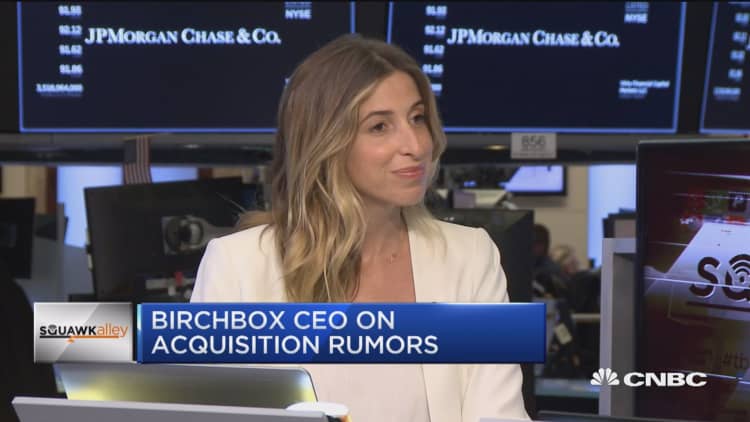Back in 2010, Birchbox CEO Katia Beauchamp and her co-founder Hayley Barna were having a hard time convincing brands to join their newly formed subscription service — offering five to six curated beauty products for a flat monthly fee. The customer base was not yet there and the business model untested.
"The story I always remember is going in to talk to brands and them saying you know, great idea but you're too small," Beauchamp said in an interview. "We just have a lot of other things to do, so come back when you have 10,000 subscribers."
Beauchamp recalled quickly accumulating the required number of subscribers only to be told her company had become "too big."
"It was just really challenging in the early days to get brands to move at the speed that the consumer was ready to move," she said. "We were so lucky that some brands did come early, like Benefit and Kiehl's, but I'd say that's a really big shift."
Today, Birchbox is active in six countries with more than 1 million subscribers and 500 brand partnerships including marquee names like MAC and Lancome. However, an ensuing stream of players in the subscription marketplace has put pressure on the brand's popularity of late. To react, the company is broadening its reach.
According to the most recent analysis by management consulting firm McKinsey, Birchbox was only the 11th largest subscription e-commerce company by sales in 2018, falling two places from its number 9 spot back in 2017.
Back in March, Birchbox raised its monthly subscription service fee to $15 from $10 — the first price hike since its inception.
Ipsy, the only other beauty subscription service that made the list, maintained its position at number six for both consecutive years. The company was founded just a year after Birchbox in San Mateo, California, by current CEO Marcelo Camberos, President Jennifer Jaconetti Goldfarb, and YouTube beauty tutorial pioneer Michelle Phan. (Phan has since left the company.)
While Ipsy uses a similar subscription model to its New York-based rival, offering a variety of beauty products for just $12 a month, its advantage lies in tapping the power of beauty influencers to attract customers.
Data and software company Tribe Dynamics has created a metric known as the EMV (earned media value), which calculates the value of digital engagement with influencer content. According to their research Ipsy's influencer EMV is estimated at nearly $45 million this year alone. In comparison, Birchbox's EMV has only garnered around $1.5 million in the same period.
Ipsy's method has also paid off in subscriptions, with Ipsy now boasting 3 million active members and $500 million in total revenue, according to a company statement released in September.
"An influencer-led marketing strategy in this industry is successful because the brand is able to borrow the equity and credibility of the influencer," said Sherry Jhawar, president of Blended Strategy Group, which specializes in celebrity and influencer branding. "[They are] utilized as the content creator, editor, publisher and the megaphone in a multi-purpose way."
However, Birchbox has now shifted its strategy almost completely away from the typical beauty connoisseur for growth. Back in June, they launched a campaign targeting "everyday" men and women who don't necessarily prioritize a beauty- and grooming-centered lifestyle.
"We haven't hired a lot of people from the beauty industry because we found that people who don't know the rules can be very powerful," Beauchamp said. "The insight for us is a focus on how do you serve 60% of the market who could spend a lot more and grow the whole industry?"
According to a 2018 survey of more than 1,000 men and women by market research company Euromonitor, 13% of participants currently use a beauty subscription box, while 13% have tried in the past and nearly 74% have never used it before.
As a way to capture this untapped consumer base, Birchbox launched its first-ever brick-and-mortar deal with Walgreens last October.
"I feel very interested in this idea of how to use these physical locations as a great place to establish the brand [and] help us be on people's minds to transact," Beauchamp said.
Most recently, Birchbox announced that Walgreen Beauty Consultants across 3,000 locations in the U.S. are now able to sign up new customers to Birchbox using tablets in-store. While Birchbox declined to comment on exact figures, roughly 65% of its total revenue comes from its subscription services, while 35% comes from full-sized product purchases.
"Things have become very crowded, not just for subscription but for your time," said Beauchamp. "I'd say that's the biggest challenge for me and for all of our team is we don't want to be just peddling samples."
In the past five years, the subscription e-commerce market has grown nearly 60% and is currently valued at around $12 billion to $15 billion, according to the McKinsey report. While broader economic concerns of late have put into question the sustainability of the overall subscription model, Beauchamp remains optimistic that Birchbox's niche category should help keep it afloat.
"We all know [beauty isn't] perfectly recession-proof, but it is one where treating yourself in this category is such a lower entry point than treating yourself in a lot of other categories," she said.
According to Earnest Research, a third-party credit card data company, Birchbox customers nearly doubled their incremental spending on overall beauty products within 12 months of subscribing. Looking forward to the next 10 years, Beauchamp hopes to expand Birchbox's brick-and-mortar relationships to become the beauty and wellness destination for the everyday consumer.
"Right now Walgreens is a really big initiative for us [and] taking a lot of time and mindshare, and we want to turn that into a big opportunity," she said. "So this idea that you know [Birchbox] becomes the place if you don't love beauty you are still discovering, learning and transacting."



